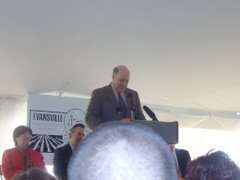Wednesday, September 19, 2012
Mailbag: Vinehout Writes: "What is a Fair Tax?"
"What is a Fair Tax?"
“The Fair Tax will take care of all the tax questions that have been proposed,” my friend in Osseo wrote. “Remember, I told you, this tax code is only 139 pages, compared to over 70,000 in the current one. You really should just take a look at what it is all about.”
So I followed his advice and checked out the plan.
The “Fair Tax” is a proposal to replace the current income, capital gains and payroll taxes with a 23% consumption tax on new goods and services: no exceptions.
The Internal Revenue Service would go away. Workers and employers alike would not pay any tax on payroll - making wages less expensive for businesses.
Medicare and Social Security would be funded through money brought in by the new federal sales tax. The proponents of the tax say it is simple, transparent and fair to everyone. Those opposed say it would raise the cost of everything we buy.
The tax is transparent – you can see exactly how much you are going to pay. Your new car will cost nearly a quarter more; as will dog food and your prescription drugs. Every visit to the lawyer or insurance agent; every time you write a check; even your movie ticket and popcorn; you will be paying 23% more.
But is this good tax policy?
The tax is very transparent – everyone can see it on everything they buy; it is simple – which is its appeal. But is it fair?
People of more modest means spend a greater proportion of their income buying things. If you are of modest means, much of your money goes to items like food, medicine, housing, and transportation. These are all ‘consumable’ and, under the “Fair Tax”, taxable.
Most of us realize that as we make more money, we spend more money.
But there is a limit to how much money one can spend on ‘things’ and the wealthy do not spend, proportionately, as much of their income on ‘consumables’.
As one gains wealth, some of that wealth is invested - in real estate, stocks, business investments and financial instruments. These are not taxed as ‘consumable’ even though buying property as an investment is something someone does with income – just as buying food is something someone does with income.
So the effect of a consumable tax is to shift the payment of taxes away from those with greater means to those with less means.
The “Fair Tax” movement has spread to some states. Missouri, South Carolina and Arkansas all had proposals introduced to eliminate the corporate and personal income tax and replace them with a much-expanded sales tax. To help off-set the burden of this tax sometimes a rebate was included for low-income people.
We can learn from other states about how fair a “Fair Tax” might be.
Tennessee for example has an expanded sales tax of almost 10% - although the rate is reduced for groceries. The effect of the tax is to make the poorest pay four times as much of their income as the wealthiest people.
According to the Institute on Taxation and Economic Policy (ITEP), Tennessee’s residents who are in the lowest 20% of income pay almost 12% of their income on taxes; while the top 1% of earners pay just 3.1%.
ITEP ranks Tennessee as the 4th most regressive state tax system in the US.
Just about everyone agrees taxes should be fair. But fair means so many different things to different people. One question to ask of tax changes is “how will the tax affect people at different levels of income?”
If a “Fair Tax” system means moving in the direction of Tennessee, I’d say the “Fair Tax” is anything but fair.
If you know someone who would like to be added to this distribution list, please let us know.
If you wish to unsubscribe from this newsletter, reply with "Unsubscribe" in the subject line
Sen.Vinehout@legis.wisconsin.gov State Capitol Room 316 South - P.O. Box 7882, Madison, WI 53707-7882 Toll Free: (877) 763-6636 or
(608) 267-2871
Subscribe to:
Post Comments (Atom)






























Dont even talk about Fairtax, good or bad,, unless you know the BS crazy stuff in the fine print.
ReplyDeleteFairtax is a perfect example of how gullible people are. Read the fine print.
Fairtax is not really a tax plan. It's political theater. When you read the fine print, you will realize the huge taxes on city county and states are impossible. They have MASSIVE taxes on city county and states, really audacious. They pretend to be a simple PERSONAL retail tax. But that is only a small part of it, like the front door of my house is only a small part of the entire building.
Yes, they have a retail sales tax, but WOW, do they have other taxes, much much larger taxes, in the fine print.
http://fairtaxgoofy.blogspot.com/